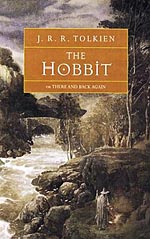
![]() hillsandbooks96
hillsandbooks96
7/8/2025
![]()
Revisiting this classic of fantasy adventure shortly after re-reading The Lord of the Rings and having not only a greater understanding of the background of Middle-earth, but also of Tolkien's philosophy on certain things, means that I got a lot out of this particular re-read of a book I haven't picked up for perhaps 10+ years.
One theme that stood out to me is the story's close alignment with the land, the idea of home, and a sense of belonging (of course exemplified by the dwarves' desire to retake the Lonely Mountain), and how it takes leaving your home and throwing yourself out of your comfort zone - as Bilbo does - to appreciate what you have, where you hang your hat, or put your feet up.
long ago in the quiet of the world, when there was less noise and more green
Anyone who is familiar with Tolkien's love of nature, his desire to conserve it and aversion to industrialisation will recognise the feeling intended by such a line.
Although conceived as a standalone work, the links to The Lord of the Rings are there if you pay attention, as Tolkien made some small but not insignificant edits to The Hobbit to make it fit in with his later work. Some of the language, particularly towards the end of the book, seemed more familiar to what can be found in his 1950s magnum opus:
In it smote and vanished, barb, shaft and feather, so fierce was its flight. With a shriek that deafened men, felled trees and split stone, Smaug shot spouting into the air, turned over and crashed down from on high in ruin
Compare that passage to the one describing the demise of the Balrog in Fellowship and note the parallels in not just the significance of defeating a monster which, up to that point, had merely been legend, but also in the words used: smote... in ruin
The use by Tolkien of an omniscient voice to narrate the story gives it a conversational and almost interactive approach that lends itself perfectly to a bedtime reading to a child - then of course, The Hobbit was written originally by Tolkien for his own children. And as a children's story, it is essentially, functionally perfect, and remains a fine example of timeless and cosy escapism.
https://www.goodreads.com/user/show/158820077-dan-roebuck